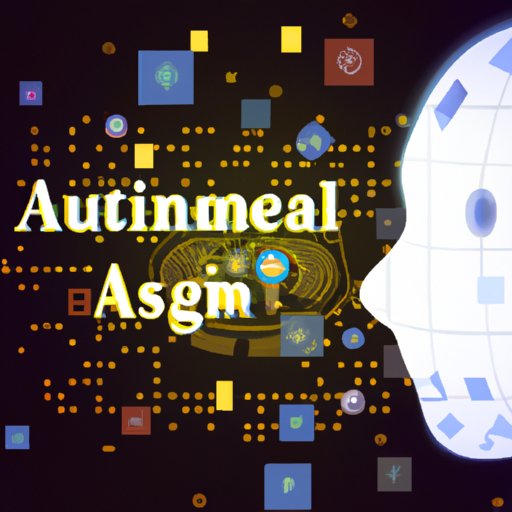Introduction
Artificial intelligence (AI) has become a major player in the gaming industry. From early arcade games to modern virtual reality experiences, AI has been used to create increasingly immersive and realistic gaming experiences. But what exactly is AI in games, and how does it impact the way we play? In this article, we will explore the impact of AI on video game technology, discussing the history of AI in gaming, how it is changing the way we play, and examining the benefits and drawbacks of AI in games.

Exploring the Impact of AI in Video Games
AI has been used in video games since the earliest days of gaming. The first arcade games used basic AI algorithms to control their enemies and obstacles. Over time, AI became increasingly sophisticated, with developers using AI to create believable non-player characters (NPCs), dynamic environments, and more complex gameplay mechanics. Today, AI is being used to create ever-more-realistic gaming experiences, from tactical shooters to open world RPGs.

An Overview of AI in Gaming History
Early AI in video games was relatively simple. Early arcade games used basic AI algorithms to control their enemies and obstacles. In the 1980s, developers began to use AI to create more realistic NPCs, such as the guards in Atari’s 1983 game “Berzerk”. As gaming technology advanced, so did AI. By the 1990s, developers were using AI to create dynamic environments and more complex gameplay mechanics.
In recent years, advances in AI technology have allowed developers to create even more sophisticated gaming experiences. AI can now be used to create NPCs that are capable of making decisions based on their environment, as well as to create procedural content such as levels, items, and enemies. AI can also be used to generate realistic terrain and weather systems, as well as to create adaptive difficulty levels.
How AI is Changing the Way We Play
One of the most significant impacts of AI on video game technology is the ability to create believable NPCs. AI-controlled characters are now capable of making decisions based on their environment, allowing them to react to players’ actions in a realistic manner. This in turn leads to more dynamic and immersive gameplay experiences, as players must respond to the actions of their opponents in order to succeed.
AI can also be used to create enhanced player experiences, such as adaptive difficulty levels that adjust to the player’s skill level. AI can also be used to generate realistic terrain and weather systems, as well as to create dynamic events and encounters. All of these features allow for more immersive and engaging gaming experiences.
Examining the Benefits and Drawbacks of AI in Games
The use of AI in games has its advantages and disadvantages. On the plus side, AI can create immersive and dynamic gaming experiences, as well as enhance player experiences with features such as adaptive difficulty levels. AI can also be used to generate realistic terrain and weather systems, as well as to create dynamic events and encounters.
On the other hand, AI can lead to issues such as bugs and glitches, as well as the potential for cheating. AI can also be computationally expensive, which can lead to poor performance on lower-end hardware. Additionally, AI-driven games may lack the depth and complexity of games that are designed by humans.

The Future of AI in Gaming Technology
As AI technology continues to advance, the potential for AI-driven games is immense. AI could be used to create highly realistic virtual worlds, as well as games that feature intelligent NPCs that are indistinguishable from human players. AI could also be used to create adaptive difficulty levels that adjust to the player’s skill level, as well as to generate dynamic events and encounters.
However, there are still many challenges that need to be overcome before AI-driven games can become a reality. AI is computationally expensive, and creating believable NPCs is a difficult task. Additionally, AI-driven games may lack the depth and complexity of games that are designed by humans. Nonetheless, the potential for AI in gaming technology is exciting, and the future looks bright.
Conclusion
AI has had a major impact on video game technology, allowing developers to create increasingly immersive and realistic gaming experiences. AI can be used to create believable NPCs, dynamic environments, and enhanced player experiences. However, there are both benefits and drawbacks to AI in games, and the technology is still in its infancy. Nonetheless, the potential for AI in gaming technology is exciting, and the future looks bright.
(Note: Is this article not meeting your expectations? Do you have knowledge or insights to share? Unlock new opportunities and expand your reach by joining our authors team. Click Registration to join us and share your expertise with our readers.)
